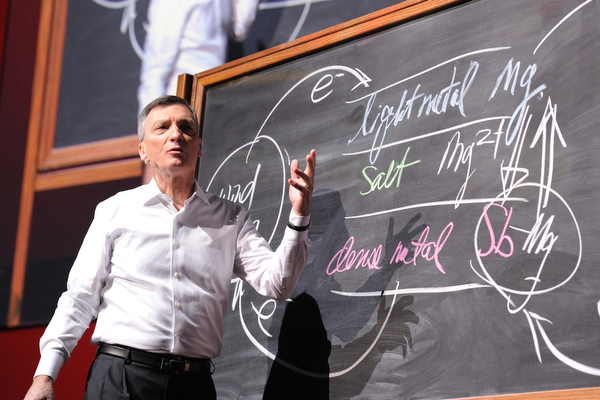Photo: James Duncan Davidson
“The electricity powering the lights in this theater was generated just moments ago,” says MIT professor, Donald Sadoway, now on stage at TED2012 to talk power. “The way things stand, electricity demand must be in balance with electricity supply.” The problem is: coal and nuclear plants can’t address demand fast enough. How do we deal with the problem of intermittency?
Sadoway thinks he has the answer, and in this hugely well-received talk, he outlines his invention of a liquid metal battery he thinks might act as a blueprint for the future. “If we’re going to get this country out of its current energy situation, we can’t conserve our way out, we can’t drill our way out, we can’t bomb our way out. We’re going to do it the old-fashioned American way: we’re going to invent our way out, working together,” he says to whoops of applause.
Realizing the critical importance of the humble battery as a way to help with the energy crisis — and that, nonetheless, there is simply “no battery technology capable of meeting the demanding performance requirements of the grid,” Sadoway started to think differently. “We need to abandon the paradigm of chasing the coolest chemistry to chase down the cost curve by making lots of products,” he says. Instead, he wanted to invent to the pricepoint of the electricity market. “If you want to make something dirt-cheap, make it out of dirt. Preferably dirt that’s locally sourced.” He also decided to be seemingly perverse in his hunt for potential electricity storage, looking at a source that neither generates nor stores electricity but in fact consumes huge amounts of it: aluminum production.
And that’s how and why he discovered a way to sandwich necessary salts with both high- and low-density metals to harness the potential of aluminum smelting in the name of creating an electricity storage device. He didn’t necessarily think it would work — nor did any of his students, those he gathered to share in his “passion for science in the service of society, not science in service of career building.” Cutely, he paraphrases JFK at Rice University in 1962: “we choose to work on gridlevel storage not because it is easy but because it is hard.”
Yet, to date they have enjoyed some serious success, and have already developed various liquid batteries, from the “shotglass” up to the 16-inch “pizza”, which produces one kilowatt-hour of energy. The 36-inch-wide “Bistro Table” is not yet ready for prime time, but a future variant is designed to produce the daily electrical needs of 200 American households with a battery that is “silent, emissions free, has no moving parts, is remotely controlled, and is designed to the market price point, without subsidy.” Cue applause.

Comments (35)
Pingback: Donald Sadoway’s TED Talk on Grid Energy Storage | Bevault
Pingback: TED2012 remixed: It’s Time for TED « Curio.us
Pingback: GIASTAR – Storie di ordinaria tecnologia » Blog Archive » The story of how Bill Gates discovered (& backed) a battery startup
Pingback: The story of how Bill Gates discovered (& backed) a battery startup | NewsDirect.mobi
Pingback: The story of how Bill Gates discovered (& backed) a battery startup | TechDiem.com
Pingback: The story of how Bill Gates discovered (& backed) a battery startup — Cleantech News and Analysis
Pingback: The story of how Bill Gates discovered (& backed) a battery startup — Cleantech News and Analysis
Pingback: Liquid Metal Battery: “Saving Electricity for Our Future” | MetalMiner
Pingback: Invasion of the flying robots | Latest Breaking News Headlines
Pingback: Reinventando las baterías: Pila Líquida…
Pingback: Wrapping up UrbanActive | TEDActive Blog
Pingback: 2012 – March – Week 1 | Warp Speed Computers
Pingback: Invasion of the flying robots | Daily Hot News!
Pingback: HOT NEWS & ENTERTAINMENT » Invasion of the flying robots
Pingback: Invasion of the flying robots | Solar Green Generation
Pingback: Invasion of the flying robots | BiZZBo@rd | Find People Who Share Your Business.
Pingback: Moneymentos » Blog Archive » Invasion of the flying robots » Moneymentos
Pingback: Trending Tech: Top Ten TED Talks - Weber Shandwick Seattle
Pingback: Liquid battery could charge green energy - I Hate Paypal » I Hate Paypal
Pingback: Regina Saphier TED Long Beach 2012 Day 2 « mytedblog